Ph.D. in Medical Physics
General info.
- Faculty working with students: 59
- Students: 51
- Students receiving Financial Aid: 100% of PhD students
- Part time study available: No
- Application terms: Fall
- Application deadlines: November 30
Email: [email protected]
Website: https://medicalphysics.duke.edu

Program Description
The Medical Physics Graduate Program is an interdisciplinary program sponsored by five departments: radiology, radiation oncology, physics, biomedical engineering, and occupational and environmental safety (health physics). Four academic tracks are offered: diagnostic imaging physics, radiation oncology physics, nuclear medicine physics, and health physics. There are currently 51 faculty members associated with the program, and many of these are internationally recognized experts in their fields of study.
The program has available one of the best medical centers in the United States, with outstanding facilities in radiology and radiation oncology for the clinical training elements of the programs. The program has 5,000 square feet of dedicated educational space in the Hock Plaza Building and access to state-of-the-art imaging and radiation therapy equipment in the clinical departments.
Existing equipment and facilities include:
- radiation oncology equipment for 3-D treatment planning, image guided therapy, and intensity modulated radiation therapy;
- radiation protection lab equipment (whole body counter, high resolution germanium gamma detector, liquid scintillation counter);
- dedicated equipment for radiation dosimetry;
- nuclear medicine cameras and scanners in PET and SPECT;
- digital imaging laboratories with dedicated equipment for physics and clinical research in digital radiography and CT;
- the Ravin Advanced Imaging Laboratories;
- the Center for In Vivo Microscopy;
- laboratories for monoclonal antibody imaging and therapy;
- excellent resources for MRI imaging (including a research MR scanner, the Brain Imaging and Analysis Center, and the Center for Advanced Magnetic Resonance Development); and
- ultrasound laboratories in biomedical engineering.
The program is accredited by the Council on Accreditation of Medical Physics Educational Programs (CAMPEP).
- Medical Physics: PhD Admissions and Enrollment Statistics
- Medical Physics: PhD Completion Rate Statistics
- Medical Physics: PhD Time to Degree Statistics
- Medical Physics: PhD Career Outcomes Statistics
Application Information
Application Terms Available: Fall
Application Deadlines: November 30
Graduate School Application Requirements See the Application Instructions page for important details about each Graduate School requirement.
- Transcripts: Unofficial transcripts required with application submission; official transcripts required upon admission
- Letters of Recommendation: 3 Required
- Statement of Purpose: Required (See department guidance below)
- Résumé: Required
- GRE Scores: GRE General (Optional)
- English Language Exam: TOEFL, IELTS, or Duolingo English Test required* for applicants whose first language is not English *test waiver may apply for some applicants
- GPA: Undergraduate GPA calculated on 4.0 scale required
Writing Sample None required
Additional Components To help us learn more about you, please plan a video response to the following question:
How would a Duke PhD training experience help you achieve your academic and professional goals? (max video length 2 minutes). When you are ready, please use the Video Essay tab in the application to record your video.
We strongly encourage you to review additional department-specific application guidance from the program to which you are applying: Departmental Application Guidance
List of Graduate School Programs and Degrees
- Admissions Overview
- Undergraduate Admissions
- Graduate Degree Programs
- International Student Admissions
- Academics Overview
- Undergraduate Majors & Minors
- Graduate School
- Purdue Online Learning
- Tour Purdue’s Campus
- Research and Innovation Overview
- Research & Partnerships
- Corporate & Global Partnerships
- Purdue Research Foundation
- About Purdue
- Office of the President
- Commitment to Free Speech
- Student Life at Purdue
- Purdue Activity & Wellness
- Campus Inclusion
- Prospective Students
- Current Students
- Faculty and Staff
- Purdue Northwest
- Purdue Fort Wayne
- Purdue Global
- Purdue Online
Medical Physics Graduate Program (CAMPEP Accredited)
School of Health Sciences
Medical physics is an applied branch of physics that applies physical energy to the diagnosis and treatment of disease. Professional medical physicists are involved in clinical service, consultation, research and teaching.
At Purdue, the medical physics graduate program provides a strong foundation in radiological and applied physics training within the medical physics profession — but also offers advanced coursework, clinical laboratories, internships and opportunities to participate in cutting-edge research. The medical physics program is closely aligned with biophysics, bioengineering, medical schools and health physics (radiation protection and control).
Our goal is to provide courses and experience with clinical systems to enhance problem-solving skills and individual thought to further advance the field of medical physics.
The Purdue medical physics program is CAMPEP -accredited.
Program Highlights
Meet and learn from your peers by joining the Medical Physics Club of Purdue or the Purdue Association for Magnetic Resonance .
Program Statistics
- 2023 to 2027 (PDF)
- 2018 to 2022 (PDF)
- 2012 to 2017 (PDF)
A program must publicly describe the program and the achievements of its graduates and students, preferably through a publicly accessible web site. This information must be updated no less often than annually and must include, for each degree program (MS and/or PhD), the number of: applicants to the program, students offered admission, students matriculated, and graduates. Where possible, information on the destinations of graduates must also be provided, i.e., residencies, industry positions, etc.
Student Papers and Presentations
Semester Meeting
- Presentation
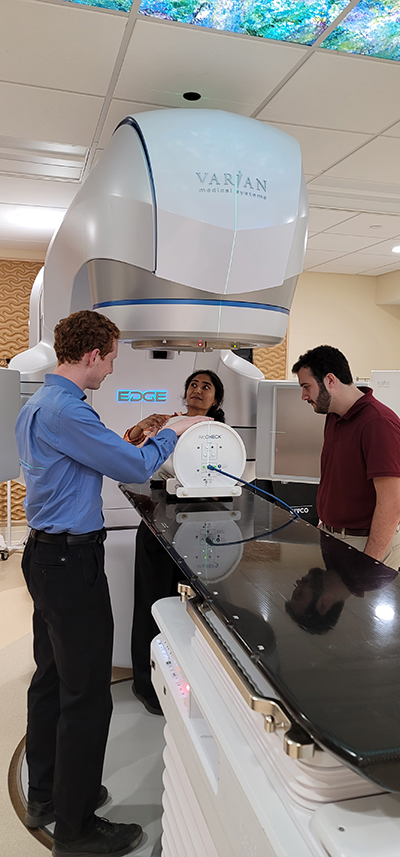
- You will be integrated into faculty laboratories and clinical facilities to work with faculty on a variety of research projects to advance disease diagnosis and treatment.
- Clinical laboratories and internships are available in therapeutic and diagnostic physics at the Purdue Life Science MRI facility, in radiology at Purdue’s College of Veterinary Medicine and at Memorial Medical Hospital and in radiation oncology at the Indiana University School of Medicine Hospital.
- Advanced coursework is offered in oncology, MRI theory and acquisition, magnetic resonance spectroscopy, PET/SPECT imaging and more.
Potential Careers
- Scientist in industries associated with radiological and radiation therapy equipment and support
- Scientist within state and federal government agencies
- Therapeutic medical physicist
- Diagnostic medical physicist
- Medical health physicist
Concentrations
You will work through the core medical physics courses and then follow one of two specialized tracks: therapeutic radiological physics or diagnostic (imaging) radiological physics
Program Quick Facts
Degree Type: Certificate, Master’s, Doctoral
Program Length : Certificate: 9 months (only students with prior PhD are eligible) Master’s: 2
PhD: 4-5 years entering with BS, 2-3 years entering with MS
Location : West Lafayette, IN
Department/School : School of Health Sciences
You will have the opportunity to work directly with medical physics faculty on interdisciplinary projects to advance understanding of image-guided and biology-based therapy; diagnostic imaging of cancer, neurological function and disease; and new uses of particle beams in detection and treatment.
- Ulrike Dydak
- Oluwaseyi (Seyi) Oderinde
- Matthew Scarpelli
- Aaron Specht
- Keith Stantz
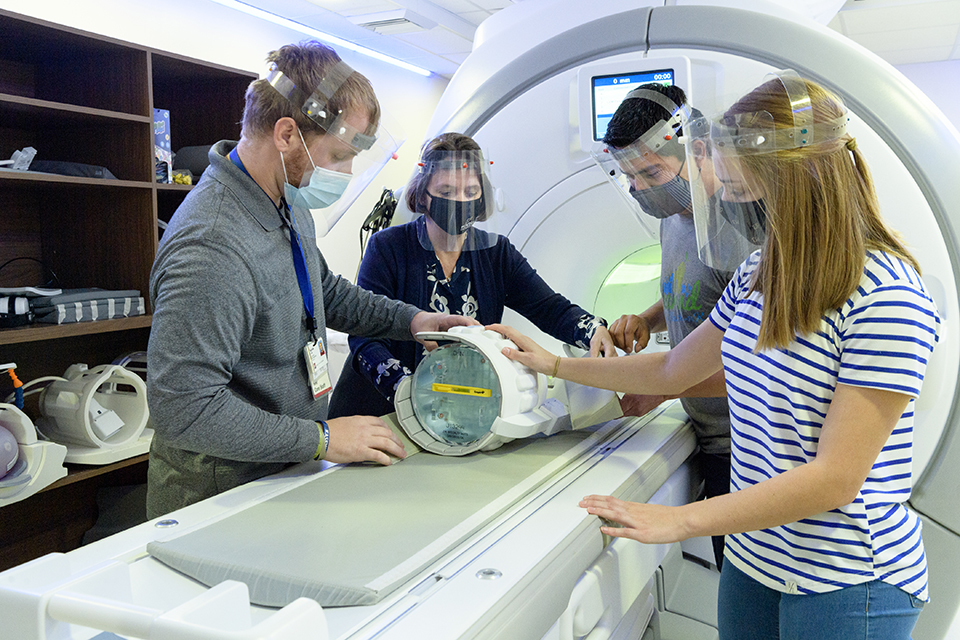
Research Opportunities
- MRI and MRS in diagnosis of neurotoxicity and radiation response
- Neutron and X-ray technologies for human body composition, disease diagnoses, and radiotherapy
- Imaging and tracer development in PET and SPECT
- Dynamic contrast enhanced imaging (CT, PCT) and thermoacoustic in image-guided therapy
- IMRT and normal tissue response to radiation therapy
Research Areas
- Health physics (radiation protection)
- Imaging sciences
- Medical physics
- Occupational and environmental health sciences (industrial hygiene, ergonomics)
Research Facilities
- Life Science MRI facility
- The Birck Nanotechnology Center
- The Bindley Bioscience Center
- The Regenstrief Center for Healthcare Engineering
- Purdue’s Center for the Environment
Admissions/Requirements
Applications submitted prior to January 10, 2023 will be considered for fellowships and awards .
Applicants to the MP program are expected to have an undergraduate degree in physics, engineering or comparable academic training, such as Purdue’s B.S. degree in Pre-Medical Physics. Minimum undergraduate coursework typically include:
- Analytic Geometry and Calculus (2 semester sequence), Multivariate Calculus and Differential Equations (1 semester)
- General Chemistry (2 semester sequence)
- Fundamentals of Biology (2 semester sequence)
- Human Anatomy and Physiology (2 semester sequence)
- Modern Mechanics, Electricity and Optics, Electricity and Optics Laboratory, Modern Physics, Modern Physics Lab, Intermediate Mechanics, and Quantum Mechanics
- Elementary Statistical Methods
Students that have not completed prior coursework in anatomy and physiology upon entry into the program are required to take a 2-semester sequence of anatomy and physiology (BIOL 301/302 or BIOL 203/204). Alternate plans of study are available for students that do not have the equivalent of a B.S. or minor in physics. Students with other deficiencies in their undergraduate curriculum may be accepted or conditionally accepted into the program at the discretion of Head of the School. Students accepted on a conditional basis may be required to take additional 100, 200, 300 or 400 level classes to address coursework deficiencies. A grade of B or better in all 100, 200, 300 or 400 level classes and a cumulative GPA of 3.0 or better at Purdue University is required for students accepted on a conditional basis. Upon completing the identified deficiencies, the Head of the School, in consultation with the RHS Program Director and GC Chair, re-evaluate the admission status of conditionally accepted students and either accept or deny admission into the MP graduate program. Conditionally accepted students that are ultimately denied admission into the MP program are counseled on possibly alternate degree paths at Purdue as well as alternative career paths.
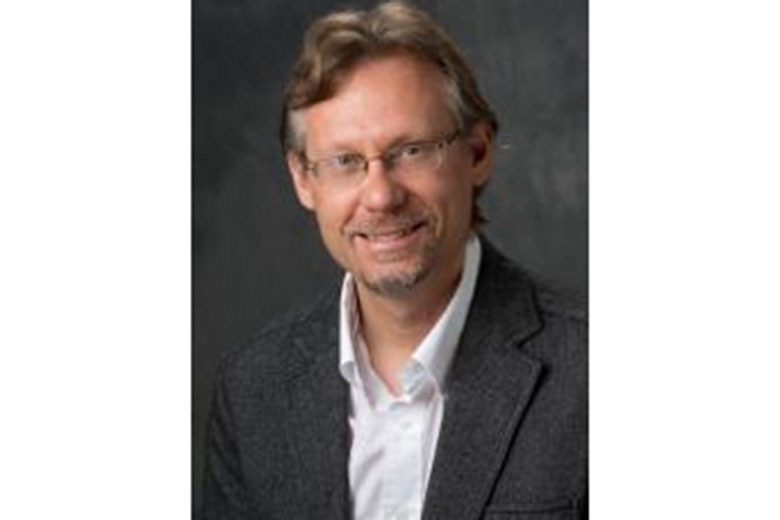
Keith Stantz | Program Director
For questions regarding the medical physics graduate program, please contact [email protected] or our graduate coordinator, Karen Walker, at [email protected] .
MEMP PhD Program
Hst’s memp phd program, is this program a good fit for me.
HST’s Medical Engineering and Medical Physics (MEMP) PhD program offers a unique curriculum for engineers and scientists who want to impact patient care by developing innovations to prevent, diagnose, and treat disease. We're committed to welcoming applicants from a wide range of communities, backgrounds, and experiences.
How is HST’s MEMP PhD program different from other PhD programs?
As a MEMP student, you’ll choose one of 11 technical concentrations and design an individualized curriculum to ground yourself in the foundations of that discipline. You’ll study medical sciences alongside MD students and become fluent in the language and culture of medicine through structured clinical experiences. You’ll select a research project from among laboratories at MIT, Harvard, affiliated hospitals and research institutes , then tackle important questions through the multiple lenses of your technical discipline and your medical training. As a result, you will learn how to ask better questions, identify promising research areas, and translate research findings into real-world medical practice.
What degree will I earn?
You’ll earn a PhD awarded by MIT or by the Harvard Faculty of Arts and Sciences.
What can I do with this degree?
Lead pioneering efforts that translate technical work into innovations that improve human health and shape the future of medicine.
How long will it take me to earn a PhD in HST’s MEMP program?
Similar to other PhD programs in MIT's School of Engineering, the average time-to-degree for MEMP PhD students is less than six years.
What are the degree requirements?
Science / engineering.
Choose one of the established concentration areas and select four courses from the approved list for the chosen area. Current MEMP concentration areas are:
- Aeronautics & Astronautics
- Biological Engineering
- Brain & Cognitive Sciences
- Chemical Engineering
- Computer Science
- Electrical Engineering
- Materials Science & Engineering
- Mechanical Engineering
- Nuclear Engineering
Harvard MEMPs fulfill Basic Science/Engineering Concentration and Qualifying Exam through their collaborating department (SEAS or Biophysics).
Biomedical Sciences and Clinical Requirements
Biomedical sciences core.
- HST030 or HST034: Human Pathology
- HST160: Genetics in Modern Medicine
- HST090: Cardiovascular Pathophysiology
Restricted Electives - two full courses required*
- HST010: Human Anatomy
- HST020: Musculoskeletal Pathophysiology*
- HST100: Respiratory Pathophysiology**
- HST110: Renal Pathophysiology**
- HST130: Introduction to Neuroscience
- HST162: Molecular Diagnostics and Bioinformatics*
- HST164: Principles of Biomedical Imaging*
- HST175: Cellular & Molecular Immunology
* May combine two half-courses to count as one full course **Must choose at least one of HST100, HST110
Clinical Core
- HST201: Intro. to Clinical Medicine I and HST202: Intro. to Clinical Medicine II
- HST207: Intro. to Clinical Medicine
PhD Thesis Guide
Letter of intent #1:.
Research advisor and topic. Due by April 30 of 2nd year.
Letter of Intent #2:
Tentative thesis committee. Due by April 30 of 3rd year.
Thesis proposal:
Defended before thesis committee. Due by April 30 of 4th year.
Final Thesis:
Public defense and submission of final thesis document.
Harvard MEMPs must an electronic copy of the final thesis including the signed cover sheet. Harvard MEMPs should not register for HST.ThG.
Qualifying Exam
TQE: Technical qualification based on performance in four concentration area courses and Pathology
OQE: Oral examination to evaluate ability to integrate information from diverse sources into a coherent research proposal and to defend that proposal
Professional Skills
Hst500: frontiers in (bio)medical engineering and physics.
Required spring of first year
HST590: Biomedical Engineering Seminar
Required fall semester of first year. Minimum of four semesters required; one on responsible conduct of research and three electives. Topics rotate.
Required for all MEMP students. (Biophysics students may substitute MedSci 300 for HST590 term on responsible conduct of research.)
Professional Perspectives
Required once during PhD enrollment
What can I expect?
You’ll begin by choosing a concentration in a classical discipline of engineering or physical science. During your first two years in HST, you’ll complete a series of courses to learn the fundamentals of your chosen area.
In parallel, you’ll become conversant in the biomedical sciences through preclinical coursework in pathology and pathophysiology, learning side-by-side with HST MD students.
With that foundation, you’ll engage in truly immersive clinical experiences, gaining a hands-on understanding of clinical care, medical decision-making, and the role of technology in medical practice. These experiences will help you become fluent in the language and culture of medicine and gain a first-hand understanding of the opportunities for — and constraints on — applying scientific and technological innovations in health care.
You’ll also take part in two seminar classes that help you to integrate science and engineering with medicine, while developing your professional skills. Then you’ll design an individualized professional perspectives experience that allows you to explore career paths in an area of your choice: academia, medicine, industry, entrepreneurship, or the public sector.
A two-stage qualifying examination tests your proficiency in your concentration area, your skill at integrating information from diverse sources into a coherent research proposal, and your ability to defend that research proposal in an oral presentation.
Finally, as the culmination of your training, you’ll investigate an important problem at the intersection of science, technology, and medicine through an individualized thesis research project, with opportunities to be mentored by faculty in laboratories at MIT, Harvard, and affiliated teaching hospitals.
Interested in applying? Learn about the application process here.

HST MEMP grad Grissel Cervantes-Jaramillo’s road to a PhD began in Cuba and wound through Florida

Biomedical Physics (BMP) PhD Program
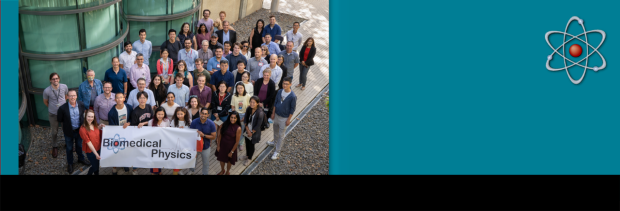
Welcome to Biomedical Physics at Stanford!
Application deadline.
December 1, 2023
Learn how to apply

Stanford University is uniquely positioned to translate fundamental discoveries in basic science to understand biology in humans and lead in academic discoveries of novel therapeutics and diagnostics.
Dr. Sanjiv Sam Gambhir, Former Chair, Department of Radiology, Stanford University
The Biomedical Physics (BMP) Graduate Program is a PhD training program hosted by the Departments of Radiology and Radiation Oncology within the Stanford University School of Medicine. The objective of the PhD in BMP is to train students in research focused on technology translatable to clinical medicine, including radiation therapy, image-guided therapy, diagnostic, interventional, and molecular imaging, and other forms of disease detection and characterization with molecular diagnostics. Given the evolution of modern medicine towards technologically sophisticated treatments and diagnostics, there is a need for well-trained leaders with this educational background and the skills to conduct meaningful and significant research in this field. Stanford University has a rich tradition of innovation and education within these disciplines, with advances ranging from the development and application of the medical linear accelerator towards radiation treatment of cancer to the engineering of non-invasive magnetic resonance imaging having been pioneered here.
Thanks to the efforts of faculty in these departments and the support of department chairs Dr. Quynh Le and the late Dr. Sam Gambhir, we created the BMP program in 2021 to train doctoral students within the world-class research environment at Stanford. In fall 2021 we will solicit our first round of applications for students. The first incoming class beginning in fall 2022 will take courses spanning traditional and emerging topics in medical physics and perform original research under the mentorship of experts in this evolving discipline. This is the first PhD program at Stanford housed in clinical departments and will be leveraged this position at the intersection of basic and clinical science to train students in translational research. We look forward to helping you achieve your educational goals within our program and to training the next generation of leaders in this burgeoning field.
Daniel Ennis, Ted Graves, Sharon Pitteri, and Daniel Spielman BMP Program Directors

The Biomedical Physics program is an essential component of Stanford Medicine’s commitment to excellence in education, scientific discovery, bench-to-bedside research, and clinical innovation.
Dr. Lloyd Minor, Dean, Stanford University School of Medicine
- Skip to Content
- Catalog Home
- Medical Physics, Ph.D.
One of the basic science departments of the UW–Madison School of Medicine and Public Health, the Department of Medical Physics offers comprehensive training in diagnostic and therapeutic medical physics and in health physics. Achievement of the Ph.D. degree in this department reflects strong scholarship and research skills in one of the top medical physics programs in North America. Graduates are prepared for teaching and/or research positions in universities, national laboratories, or in the medical and nuclear technology industries. Graduates are also prepared for admission into medical physics residency programs to become board eligible for clinical medical physics positions.
Medical physicists may participate professionally in the treatment of patients, in advanced medical imaging and diagnostic procedures, or in related areas of research and teaching. Health physicists may operate radiation protection programs at nuclear industrial facilities, hospitals, or laboratories, or may perform research on methods of measuring ionizing radiations (i.e., dosimetry).
A unique quality of the medical physics program is the broad range of expertise and research interests of the faculty. Students receive training in diagnostic x-ray physics, x-ray computerized tomography (CT), magnetic resonance imaging (MRI) and spectroscopy, nuclear medicine and positron emission tomography (PET) imaging, biomagnetism, medical ultrasound, elastography, radiation dosimetry, radiation treatment planning, and radiobiology.
The department also houses the Medical Radiation Research Center and the Accredited Dosimetry Calibration Laboratory, one of four in the US accredited by the American Association of Physicists in Medicine. In addition, the department provides clinical support services to the radiology and human oncology departments. It also operates a PET radiotracer production facility (with two cyclotrons available), a medical image analysis laboratory, and a small bore MRI scanner and photoacoustic ultrasound system in the Small Animal Imaging Facility. Each of these facilities provides unique training and support opportunities for graduate students. Access to state-of-the-art x-ray angiography, CT, MRI, and PET/CT and PET/MR systems is readily available.
The Ph.D. degree is primarily a research degree that extends the student's depth of knowledge in one of the specialty areas. Faculty positions at universities, research positions, and an increasing number of clinical physics positions require the Ph.D. degree. Medical physics faculty maintain close collaborative ties with faculty in other departments, including human oncology, radiology, cardiology, medicine, psychiatry, pharmacology, and biomedical engineering, broadening the scope of research opportunities open to medical physics students and providing access to sophisticated clinical facilities.
Please consult the table below for key information about this degree program’s admissions requirements. The program may have more detailed admissions requirements, which can be found below the table or on the program’s website.
Graduate admissions is a two-step process between academic programs and the Graduate School. Applicants must meet the minimum requirements of the Graduate School as well as the program(s). Once you have researched the graduate program(s) you are interested in, apply online .
About 80–90 applicants per year apply to the medical physics program. Each fall, the program admits 10–20 students. This results in an average enrollment of approximately 100 students each semester. Less than one-tenth of the students pursue the M.S. degree as a terminal degree, and the remainder continue on to the PhD.
A bachelor's degree in physics is considered the best preparation for graduate study in medical physics, but majors such as nuclear engineering, biomedical engineering, electrical engineering, or chemistry may also be acceptable. The student's math background should include calculus, differential equations, linear algebra, and Fourier analysis, such as might be learned in modern optics or undergraduate quantum theory. Some facility in computer programming and electronic instrumentation is desirable. One year of chemistry, a year of biology, and an introductory course in physiology are also advantageous.
Beginning graduate students should start their studies in the fall semester, as the course sequence is based on that assumption. Students applying for admission should submit an online application and all supporting documentation by December 1 to ensure consideration for admission and financial support to begin the following fall.
Admission to the graduate program is competitive. Applications are judged on the basis of a student's previous academic record, research experience, letters of recommendation, and personal statement of reasons for interest in graduate study in medical physics.
The application includes:
- The online application to the Graduate School
- Payment of the application fee
- Electronic copy of resume/CV (include awards, fellowships, and scholarships received, publications, volunteer activities, and research experience)
- Applicant data sheet
- Personal statement of reasons for interest in graduate study in medical physics. The personal statement should include your reasons for graduate study, why medical physics, your future career goals as it relates to a PhD (or MS) in medical physics and your area(s) of research interest. It is advantageous to also research and include the faculty member(s) with whom you would like to work. The personal statement should be no more than 3 pages, single-spaced, 11 point font or larger
- Transcripts from all academic institutions of study (scan and upload)
- Recommendation letters from people who can attest to your ability to be successful in the PhD program due to your experience, academics, etc.(submitted electronically through the online application)
Graduate School Resources
Resources to help you afford graduate study might include assistantships, fellowships, traineeships, and financial aid. Further funding information is available from the Graduate School. Be sure to check with your program for individual policies and restrictions related to funding.
Program Resources
The department typically supports 85–95 percent of students enrolled in the medical physics graduate program through department or university fellowships, research or teaching assistantships, or NIH NRSA training grant appointments. All awards include a comprehensive health insurance program and remission of tuition. The student is responsible for segregated fees.
Minimum Graduate School Requirements
Major requirements.
Review the Graduate School minimum academic progress and degree requirements , in addition to the program requirements listed below.
MODE OF INSTRUCTION
Mode of instruction definitions.
Accelerated: Accelerated programs are offered at a fast pace that condenses the time to completion. Students typically take enough credits aimed at completing the program in a year or two.
Evening/Weekend: Courses meet on the UW–Madison campus only in evenings and/or on weekends to accommodate typical business schedules. Students have the advantages of face-to-face courses with the flexibility to keep work and other life commitments.
Face-to-Face: Courses typically meet during weekdays on the UW-Madison Campus.
Hybrid: These programs combine face-to-face and online learning formats. Contact the program for more specific information.
Online: These programs are offered 100% online. Some programs may require an on-campus orientation or residency experience, but the courses will be facilitated in an online format.
CURRICULAR REQUIREMENTS
Required courses.
Students will take MED PHYS 900 Journal Club and Seminar four semesters for 1 credit each semester for a total of 4 credits.
Students may use one credit of MED PHYS 662 , MED PHYS 663 , MED PHYS 664 , MED PHYS 665 , or MED PHYS 666 .
MED PHYS 701 , MED PHYS 900 , and MED PHYS 990 do not count toward this requirement.
Health Physics Pathway 1
In addition to the above requirements, students completing the Health Physics emphasis must take the following courses:
An exemption from the Core Curriculum requirement requires the approval of the chair of the graduate committee. If the entirety of the Core Curriculum is not taken, the student will not satisfy the CAMPEP Core Curriculum requirement.
These pathways are internal to the program and represent different curricular paths a student can follow to earn this degree. Pathway names do not appear in the Graduate School admissions application, and they will not appear on the transcript.
Graduate School Policies
The Graduate School’s Academic Policies and Procedures provide essential information regarding general university policies. Program authority to set degree policies beyond the minimum required by the Graduate School lies with the degree program faculty. Policies set by the academic degree program can be found below.
Major-Specific Policies
Prior coursework, graduate work from other institutions.
With program approval, students are allowed to count no more than 12 credits of medical physics graduate coursework from other institutions. Coursework earned five years or more prior to admission to the doctoral degree program is not allowed to satisfy requirements.
UW–Madison Undergraduate
With program approval, 7 credits in medical physics courses from a UW–Madison undergraduate degree above the undergraduate graduation requirements are allowed to count toward the degree.
UW–Madison University Special
With program approval, students are allowed to count no more than 15 credits of coursework numbered 500 or above taken as a UW–Madison Special student. Coursework earned five years or more prior to admission to the doctoral degree program is not allowed to satisfy requirements.
For a graduate student in the Medical Physics Department who is a research assistant, fellow or trainee to be making satisfactory progress, they must:
- Obtain at least a 3.0 GPA in the most recent semester. Grades in all research courses and courses with grades of P, F, S or U are excluded from the average. A student who fails to make satisfactory progress will be dropped from the department. In exceptional cases, the chairperson may grant permission to continue for a specified probationary period.
- Maintain a minimum cumulative GPA of 3.0 for all courses taken while in the Medical Physics program and for all Department of Medical Physics courses. All research courses and all courses with grades of P, F, S or U are excluded from the average.
- Have taken the qualifier examination by the end of the 2nd semester of study. If a basic (low level) pass is not obtained on the first attempt, the second (and last) attempt to pass the qualifier examination must be made no later than the 4th semester.
Any student, who fails to meet the requirements of 1-3 above, will be placed on probation. Failure in the first semester of probation to obtain a 3.0 average for the semester and a cumulative GPA of at least 3.0 will result in termination unless the student's advisor requests and the department and the Graduate School approves, continued enrollment. The particular courses which count toward the GPA in any probation semester must be approved in writing by the student's advisor and the Medical Physics Graduate Committee Chairman in order for the work to count toward returning the student to good standing.
ADVISOR / COMMITTEE
Candidates must acquire a major professor/advisor by the beginning of the second semester of study.
CREDITS PER TERM ALLOWED
Time limits.
The oral PhD qualifying examination should be taken by the end of the 4th semester, and the PhD preliminary examination should be taken by the end of the third year of study. Permission of the graduate committee is required if the PhD preliminary examination must be taken after the end of the third year. Defense of a dissertation is required within five years of successful completion of the PhD preliminary examination.
This program follows the Graduate School's Time Limits policy .
Grievances and Appeals
These resources may be helpful in addressing your concerns:
- Bias or Hate Reporting
- Graduate Assistantship Policies and Procedures
- Office of the Provost for Faculty and Staff Affairs
- Dean of Students Office (for all students to seek grievance assistance and support)
- Employee Assistance (for personal counseling and workplace consultation around communication and conflict involving graduate assistants and other employees, post-doctoral students, faculty and staff)
- Employee Disability Resource Office (for qualified employees or applicants with disabilities to have equal employment opportunities)
- Graduate School (for informal advice at any level of review and for official appeals of program/departmental or school/college grievance decisions)
- Office of Compliance (for class harassment and discrimination, including sexual harassment and sexual violence)
- Office of Student Conduct and Community Standards (for conflicts involving students)
- Ombuds Office for Faculty and Staff (for employed graduate students and post-docs, as well as faculty and staff)
- Title IX (for concerns about discrimination)
Grievance Policy for Graduate Programs in the School of Medicine and Public Health
Any student in a School of Medicine and Public Health graduate program who feels that they have been treated unfairly in regards to educational decisions and/or outcomes or issues specific to the graduate program, including academic standing, progress to degree, professional activities, appropriate advising, and a program’s community standards by a faculty member, staff member, postdoc, or student has the right to complain about the treatment and to receive a prompt hearing of the grievance following these grievance procedures. Any student who discusses, inquiries about, or participates in the grievance procedure may do so openly and shall not be subject to intimidation, discipline, or retaliation because of such activity. Each program’s grievance advisor is listed on the “Research” tab of the SMPH intranet .
This policy does not apply to employment-related issues for Graduate Assistants in TA, PA and/or RA appointments. Graduate Assistants will utilize the Graduate Assistantship Policies and Procedures (GAPP) grievance process to resolve employment-related issues.
This policy does not apply to instances when a graduate student wishes to report research misconduct. For such reports refer to the UW-Madison Policy for Reporting Research Misconduct for Graduate Students and Postdoctoral Research Associates .
Requirements for Programs
The School of Medicine and Public Health Office of Basic Research, Biotechnology and Graduate Studies requires that each graduate program designate a grievance advisor, who should be a tenured faculty member, and will request the name of the grievance advisor annually. The program director will serve as the alternate grievance advisor in the event that the grievance advisor is named in the grievance. The program must notify students of the grievance advisor, including posting the grievance advisor’s name on the program’s Guide page and handbook.
The grievance advisor or program director may be approached for possible grievances of all types. They will spearhead the grievance response process described below for issues specific to the graduate program, including but not limited to academic standing, progress to degree, professional activities, appropriate advising, and a program’s community standards. They will ensure students are advised on reporting procedures for other types of possible grievances and are supported throughout the reporting process. Resources on identifying and reporting other issues have been compiled by the Graduate School.
- The student is advised to initiate a written record containing dates, times, persons, and description of activities, and to update this record while completing the procedures described below.
- If the student is comfortable doing so, efforts should be made to resolve complaints informally between individuals before pursuing a formal grievance.
- Should a satisfactory resolution not be achieved, the student should contact the program’s grievance advisor or program director to discuss the complaint. The student may approach the grievance advisor or program director alone or with a UW-Madison faculty or staff member. The grievance advisor or program director should keep a record of contacts with regards to possible grievances. The first attempt is to help the student informally address the complaint prior to pursuing a formal grievance. The student is also encouraged to talk with their faculty advisor regarding concerns or difficulties.
- If the issue is not resolved to the student’s satisfaction, the student may submit a formal grievance to the grievance advisor or program director in writing, within 60 calendar days from the date the grievant first became aware of, or should have become aware of with the exercise of reasonable diligence, the cause of the grievance. To the fullest extent possible, a grievance shall contain a clear and concise statement of the grievance and indicate the issue(s) involved, the relief sought, the date(s) the incident or violation took place, and any specific policy involved.
- The grievance advisor or program director will convene a faculty committee composed of at least three members to manage the grievance. Any faculty member involved in the grievance or who feels that they cannot be impartial may not participate in the committee. Committee composition should reflect diverse viewpoints within the program.
- The faculty committee, through the grievance advisor or program director, will obtain a written response from the person or persons toward whom the grievance is directed. The grievance advisor or program director will inform this person that their response will be shared with the student filing the grievance.
- The grievance advisor or program director will share the response with the student filing the grievance.
- The faculty committee will make a decision regarding the grievance. The committee’s review shall be fair, impartial, and timely. The grievance advisor or program director will report on the action taken by the committee in writing to both the student and the person toward whom the grievance was directed.
- The grievant will be notified in writing, within 5 business days of the written appeal, acknowledging receipt of the formal appeal and establishing a timeline for the review to be completed.
- The senior associate dean or their designee may request additional materials and/or arrange meetings with the grievant and/or others. If meetings occur, the senior associate dean or their designee will meet with both the grievant and the person or persons toward whom the grievance is directed.
- The senior associate dean or their designee will assemble an ad hoc committee of faculty from outside of the student’s graduate program and ask them to prepare a written recommendation on whether to uphold or reverse the decision of the program on the student’s initial grievance. The committee may request additional materials and/or arrange meetings with the grievant and/or others. If meetings occur, the committee will meet with both the grievant and the person or persons toward whom the grievance is directed.
- The senior associate dean or their designee will make a final decision within 20 business days of receipt of the committee’s recommendation.
- The SMPH Office of Basic Research, Biotechnology, and Graduate Studies must store documentation of the grievance for seven years. Grievances that set a precedent may be stored indefinitely.
- The student may file an appeal of the School of Medicine and Public Health decision with the Graduate School. See the Grievances and Appeals section of the Graduate School’s Academic Policies and Procedures .
Time Limits
Steps in the grievance procedures must be initiated and completed within the designated time periods except when modified by mutual consent. If the student fails to initiate the next step in the grievance procedure within the designated time period, the grievance will be considered resolved by the decision at the last completed step.
Most students are funded with research assistantships through the research programs of their advisors. A limited number of traineeships are available to advanced students in the UW Radiological Sciences Training Program for career training in cancer research. Other fellowships are also available to qualified students (e.g., AAPM, Cardiovascular and Neurological Sciences Training Programs, Advanced Opportunity Fellowship Program).
Take advantage of the Graduate School's professional development resources to build skills, thrive academically, and launch your career.
- Articulates research problems, potentials, and limits with respect to theory, knowledge, or practice within the field of medical physics.
- Formulates ideas, concepts, designs, and/or techniques beyond the current boundaries of knowledge within the field of medical physics.
- Creates research, scholarship, or performance that makes a substantive scientific contribution.
- Demonstrates breadth and depth within their learning experiences.
- Advances contributions of the field of medical physics to society through peer-reviewed journal publications.
- Communicates complex ideas in a clear and understandable manner in both oral and written formats.
- Demonstrates ethical research and professional conduct.
Faculty: Please see a comprehensive list of our faculty on the department website.
- Accreditation
Commission on Accreditation of Medical Physics Education Programs
Accreditation status: Accredited through December 31, 2026. Next accreditation review: Spring 2026.
- Requirements
- Professional Development
- Learning Outcomes
Contact Information
Medical Physics School of Medicine and Public Health Medical Physics, Ph.D. https://www.medphysics.wisc.edu
Graduate Program Coordinator [email protected] 608-265-6504 1005 Wisconsin Institutes for Medical Research (WIMR), 1111 Highland Avenue, Madison, WI 53705-2275
Tomy Varghese, Director of Graduate Studies [email protected]
Grievance Advisor, Wesley Culberson, Associate Professor [email protected]
Graduate Program Handbook View Here
Graduate School grad.wisc.edu
- /pdf/
- Explore Graduate Opportunities
- Explore UW-Madison's Undergraduate Opportunities
- Accounting and Information Systems
- African American Studies
- African Cultural Studies
- Agricultural and Applied Economics
- Agricultural and Life Sciences - College-Wide
- Animal and Dairy Sciences
- Anthropology
- Art History
- Asian Languages and Cultures
- Atmospheric and Oceanic Sciences
- Bacteriology
- Biochemistry
- Biological Systems Engineering
- Biomedical Engineering
- Biostatistics and Medical Informatics
- Business - School-Wide
- Cell and Regenerative Biology
- Chemical and Biological Engineering
- Chicana/o and Latina/o Studies
- Civil and Environmental Engineering
- Civil Society & Community Studies
- Classical and Ancient Near Eastern Studies
- Communication Arts
- Communication Sciences and Disorders
- Community and Environmental Sociology
- Computer Sciences
- Counseling Psychology
- Curriculum and Instruction
- Educational Leadership and Policy Analysis
- Educational Policy Studies
- Educational Psychology
- Electrical and Computer Engineering
- Engineering - College-Wide
- Food Science
- Forest and Wildlife Ecology
- French and Italian
- Gaylord Nelson Institute for Environmental Studies
- Gender and Women's Studies
- German, Nordic, and Slavic
- Graduate - School-Wide
- Horticulture
- Human Ecology - School-Wide
- Industrial and Systems Engineering
- Information School
- Institute for Clinical and Translational Research
- Institute for Regional and International Studies
- Integrative Biology
- Journalism and Mass Communication
- Kinesiology
- La Follette School of Public Affairs
- Language Institute
- Language Sciences
- Law - School-Wide
- Life Sciences Communication
- Management and Human Resources
- Materials Science and Engineering
- Mathematics
- Mead Witter School of Music
- Mechanical Engineering
- Medical Physics, M.S.
- Medicine and Public Health - School-Wide
- Nuclear Engineering and Engineering Physics
- Nursing - School-Wide
- Nutritional Sciences
- Operations and Information Management
- Pharmacy - School-Wide
- Planning and Landscape Architecture
- Plant Pathology
- Political Science
- Population Health Sciences
- Real Estate and Urban Land Economics
- Rehabilitation Psychology and Special Education
- Religious Studies
- Risk and Insurance
- Sandra Rosenbaum School of Social Work
- Soil Science
- Spanish and Portuguese
- Veterinary Medicine - School-Wide
- Nondegree/Visiting Student Guide
- Pharmacy Guide
- School of Medicine and Public Health Guide
- Undergraduate Guide
- Veterinary Guide
- The Student Experience
- Financial Aid
- Degree Finder
- Undergraduate Arts & Sciences
- Departments and Programs
- Research, Scholarship & Creativity
- Centers & Institutes
- Geisel School of Medicine
- Guarini School of Graduate & Advanced Studies
- Thayer School of Engineering
- Tuck School of Business
Campus Life
- Diversity & Inclusion
- Athletics & Recreation
- Student Groups & Activities
- Residential Life
Medical Physics Education Program
A certificate and accreditation program for Dartmouth postdocs and PhD students

The Medical Physics Education Program is available to enrolled Dartmouth PhD students in engineering and the physical sciences who have an undergraduate preparation in physics (of at least four courses beyond introductory college physics). This program was accredited in 2016 by the Commission on Accreditation of Medical Physics Education Programs (CAMPEP) , and provides the curricular training required for successful completion of an accredited medical physics graduate program. This pathway is required for a career in clinical medical physics and enables graduates to successfully sit for the ABR board exam and apply for CAMPEP accredited residency programs .
Interested students must apply for admission to the accredited program at the time of application to their PhD program at Dartmouth or shortly afterwards. All students should discuss this option with their faculty advisor and one of the program directors . This program is also available to post doctoral fellows who may enroll in the CAMPEP accredited certificate program at Dartmouth allowing pursuit of a career in clinical medical physics.
The Medical Physics Education Program enhances a Dartmouth PhD with:
- Six required didactic courses directly applicable to a career in clinical medical physics
- A practicum experience in clinical medical physics (additional applied course)
PhD students completing the program will be prepared both for further education and research in medical physics and for application into the matching process for accredited medical physics residency programs administered by CAMPEP .
This program is led jointly by Dartmouth faculty at:
- Geisel School of Medicine (in the Departments of Radiology , Surgery Orthopaedics and Medicine ).
The program uses the extensive resources of Dartmouth- Health and Dartmouth Cancer Center . The Dartmouth Association of Medical Physics Students provides some internal guidance for students.
See instructions to apply to the program .
- Graduate Education Programs
- 2009 ABR UPDATE
- Residency Education Programs
- Accredited Professional Doctorate Degree Programs
- Standards for Accreditation of Professional Doctorate Degree Programs
- Professional Doctorate Accreditation Letters
- Professional Doctorate Application Template
- Certificate Programs
- Closed Programs
- Continuing Education
- Public Disclosure
- Accreditation FAQs
- Information for Board/Committee Members

CAMPEP Accredited Professional Doctorate Programs in Medical Physics
Entries Last Updated March 28, 2024
A professional doctorate program, typically leading to a degree of Doctor of Medical Physics (DMP) consists of at least two years of didactic education followed by at least two years of clinical education. **Granted administrative extension of accreditation while under review for reaccreditation.
University of Nevada, Las Vegas 4505 S. Maryland Pkwy. Box 453037 Las Vegas, NV 89074 Program Director: Yu Kuang, Ph.D. Accredited degrees available: D.M.P. [email protected] https://www.unlv.edu/degree/doctor-medical-physic s
UT Health San Antonio 7979 Wurzbach road MC 7889 San Antonio, TX 78229 Program Director: Nikos Papanikolaou, Ph.D. Tel: (210) 450-5664 Fax: (210) 450-1076 Accredited degrees available: D.M.P. [email protected] http://catalog.uthscsa.edu/biomedicalsciences/medicalphysics/
Wayne State University Karmanos Cancer Institute Department of Radiation Oncology 4100 John R. Street Detroit, MI 48201 Program Director: Jay Burmeister, Ph.D. Tel: (313) 745-2483 / Fax: (313) 966-2314 Accredited degrees available: M.S., Ph.D. [email protected] http://medicalphysics.med.wayne.edu/
Vanderbilt University School of Medicine Departments of Radiology and Radiation Oncology 2220 Pierce Avenue Preston Research Building B-1003 Nashville, TN 37232-5671 Program Director: John Eley, Ph.D. Tel: (615)875-1625 Fax: Accredited degrees available: M.S., D.M.P. [email protected] http://medschool.vanderbilt.edu/dmp/
CAMPEP's Privacy Policy Use of the site constitutes your acceptance to its terms and conditions .
CAMPEP is a non-profit organization dedicated to the advancement of medical physics. The information provided in this website is offered for the benefit of its members, trainees and the general public. CAMPEP does not independently verify or substantiate the information provided on other websites that may be linked to this site.
PhD in Bioengineering - Medical Physics Concentration
Admission deadline, admission process.
Our Admissions Committee takes a holistic approach to evaluating applications. Along with a solid academic record and communication skills, our program is looking for individuals who desire to make an impact in the field of medical physics. An interview is required for admission. Select applicants will be invited to interview in person. Admitted applicants will be invited for Visit Day .
Applicants who wish to be considered for admission to the Master of Science in Medical Physics program if not admitted to the Bioengineering PhD program must apply to the MSMP program by the deadline. Applicants will need to use different email addresses for the Bioengineering PhD application (through the School of Engineering and Applied Science) and MSMP application (through the Perelman School of Medicine). No MS application fee is required. Email the MPGP Team at [email protected] to request a fee waiver code to put on the MS application for admission in order to waive the application fee.
Prerequisite Requirements (note explanations marked by *)
- Bachelor’s degree in physics, engineering, or physical sciences discipline from an accredited institution (or the equivalent of a U.S. four-year bachelor’s degree)
- * Minimum of an undergraduate minor in physics or its equivalent
- Complete one computer science/programming course (one semester/course). This course must be listed on the applicant's transcript
- Applicants who have completed or will be completing a master's degree in medical physics from a CAMPEP-accredited program are not eligible for the PhD in Bioengineering - Medical Physics Concentration.
Application Requirements (note explanations marked by *)
- Completion of the School of Engineering & Applied Science’s Bioengineering PhD program application for admission and all stated requirements on the Doctoral Program Admissions page . Select the Medical Physics Concentration within the application.
- An unofficial transcript in English from each university or college where you earned course credit should be uploaded into the Bioengineering PhD application. An unofficial transcript must show the applicant name, institution name, names of courses completed, and grades earned. If an unofficial transcript does not show this information, you must submit an official transcript. Official transcripts should be emailed to the MPGP Team at [email protected] directly from the issuing institution's official electronic delivery service.
- Three letters of recommendation, including at least one from a faculty member who is familiar with your scholarly abilities. (Contact information of recommenders required in online application; application system will ask these individuals to upload their letters)
- Personal statement: In 1000 words or less, please describe your career objectives and reasons for choosing the PhD in Bioengineering - Medical Physics Concentration program at Penn, including any previous experience with the field of medical physics. Also, use this as an opportunity to tell us about yourself and help us get to know you better. A well-written and thoughtful, though concise, essay is an important part of your application.
- Completion of Intent to Apply to the Medical Physics Concentration form
- **Additional requirements for applicants with degrees earned outside of the U.S.
It is preferred that applicants:
- Take undergraduate coursework in these subject areas : Differential Equations, calculus (four semesters/courses), chemistry (two semesters/courses), biology (one semester/course)
*Minimum of an Undergraduate Minor in Physics or its Equivalent
- A minor in physics, required by CAMPEP, is defined as two calculus-based introductory physics courses and at least three upper-division (junior- or senior-level) undergraduate physics courses . Upper-division physics courses include Electricity and Magnetism (preferred), Atomic Physics (preferred), Modern Physics (preferred), Quantum Mechanics (preferred), Classical Mechanics (preferred), Optics, Nuclear Physics, and Heat & Thermodynamics. The advanced physics courses should address theoretical principles from a physics curriculum. Courses that are primarily applied and related to engineering, chemistry, health, or medical physics are not acceptable.
- Per the American Board of Radiology (ABR), standards for course acceptability are: 1) the course must appear on an official transcript; 2) the course must be equivalent to a standard 3-credit course; and 3) the course must have a passing standard. It is recommended that you contact the professor of the course to inquire if you are unsure of whether a course meets these standards, or if you are unsure if the course is considered introductory or upper-division at the undergraduate level as compared to the other physics courses offered at the institution. Massive open online courses (MOOC) such as EdX and Coursera typically do not meet these standards and thus are not acceptable.
- Applicants may earn the equivalency of a physics minor at any regionally accredited institution. Transcripts of all courses taken for credit are a requirement of the application.
**Additional Requirements for Applicants with Degrees Earned Outside of the U.S.
- University of Pennsylvania
- Department: SEAS Graduate Admissions (Engineering)
- Educational Perspectives reports can be directly selected from within the online application. If using Educational Perspectives, it is encouraged to submit your application at least two months in advance to allow sufficient time for the transcript evaluation process.
- The minimum TOEFL score required for admissions consideration is: 100 (iBT), 250 (CBT) or 600 (PBT).
- The minimum IELTS score required for admissions consideration is 7.
- The minimum Duolingo English Test (DET) score required for admissions consideration is 130.
- The Medical Physics Graduate Programs reserves the right to request an English proficiency test or interview from any applicant, may make enrollment in English language courses a condition for admission, and/or may subsequently require that an admitted student enroll in English language courses based on an assessment of the student’s English language skills in the classroom.
Questions about the Bioengineering PhD application should be sent to SEAS Enrollment Specialist Abby Whittington or via the inquiry form .
Questions about the Medical Physics Concentration application process or the Intent to Apply to the Medical Physics Concentration form should be sent to the MPGP Team .
Medical Physics, MS
School of medicine.
The program is designed for full-time students who wish to pursue a career as a medical physicist either as a researcher, as a certified clinical profession, or in industry. The program will require successful completion of a minimum of 38 credits for Master’s degree and completion of a research thesis (in conjunction with one or more of the faculty). Full-time master’s students will complete the program in two years.
Admission Requirements
- B.S. degree or B.A. degree in physics, applied physics, or one of the physical sciences, including physics training at least equivalent to a minor
- Official transcript of school record, personal statement, three letters of recommendation, and curriculum vitae
- Demonstrated proficiency in written and spoken English (TOEFL/IELTS required for non-native English speakers)
- General GRE exam scores are required (physics GRE is recommended)
For more information on graduate education at the Johns Hopkins University School of Medicine, see: Johns Hopkins University School of Medicine Graduate Programs
Contact Information
Inquiries may be directed to [email protected] .
Program Requirements
This program consists of 38 credits (cr). There is also a research ethics and responsible conduct of research requirement.
Core Medical Physics Courses (20 Cr)
All Medical Physics students are required to take the following courses:
- ME.420.702 Radiological Physics and Dosimetry fall Yr 1
- ME.420.703 Radiation Therapy Physics spring Yr 1
- ME.420.704 spring Yr 1
- ME.420.705 Medical Physics Seminar must be taken first three semesters, but only 1 credit can be counted toward degree requirement
- ME.420.706 Radiation Biology fall Yr 2
- ME.420.710 Medical Imaging Systems fall Yr 1
- PH.183.631 Fundamentals of Human Physiology (4 cr) fall Yr 1 - Public Health crs
- Professionalism and Ethics (0 cr) fall Yr 1
- Responsible Conduct of Research (0 cr)* fall and spring Yr 1
*University requirement for graduation; no credit
OTHER REQUIRED COURSES (6 cr)
All MP students are required to take the following additional courses.
- ME.420.707 Nuclear Medicine Imaging fall Yr 2
- ME.420.709 Radiopharmaceutical Therapy spring Yr 2
Research Project (6 Cr)
Students are required to take at least 6 cr of independent research project or master's thesis research.
Elective Courses (6 Cr)
Students shall take 6 (or more) additional credit hours from the following list of courses or other courses as approved by the Program Director.
SOM Medical Physics (EB campus)
- ME.420.xxx Advanced Image Reconstruction (3 cr)
- ME.420.xxx Quantitative Imaging Analysis (3 cr)
- ME 420.xxx Molecular Imaging (3 cr)
PH Biostatistics (EB campus)
- PH.140.615 Statistics for Laboratory Scientists I (4 cr)
Biomedical Engineering (Homewood campus)
- EN.580.640 Systems Pharmacology and Personalized Medicine (4 cr)
- EN.580.674 Introduction to Neuro-Image Processing (3 cr)
- EN.580.679 Principles and Applications of Modern X-ray Imaging and Computed Tomography (3 cr)
- EN.580.693 Imaging Instrumentation (4 cr)
Electrical and Computer Engineering (Homewood campus)
- EN.520.623 Medical Image Analysis (3 cr)
- EN.520.631 Ultrasound and Photoacoustic Beamforming (3 cr)
- EN.520.659 Machine learning for medical applications (3 cr)
- Diversity and Inclusion
- PhD Requirements
- Course Sequence
- Course Descriptions
- Policy Handbook
- Careers in Medical Physics
- Graduate Program Statistics
Medical physics applies the principles of the physical sciences to biomedical problems. The activities of medical physicists cover a broad spectrum that ranges from the study of basic biomedical processes to the diagnosis and treatment of disease, and thus, the training of a medical physicist must be broad. To participate fruitfully in this interdisciplinary profession, a medical physicist must be thoroughly competent in the physical and mathematical sciences related to imaging physics and radiation physics, must understand biological principles, and must be able to communicate with physicians.
The Committee on Medical Physics offers a program to provide aspiring medical physicists with the knowledge that they will need in their future profession. Our program leads to the Doctor of Philosophy degree with emphasis on research that provides preparation for careers in academia, industry, and/or clinical support roles.
The medical physics program at the University of Chicago is recognized internationally for its research excellence. Many of the investigators are leaders in their respective specialties. Also, because the program is located in the Medical Center of the University, there are strong interactions between the clinical and research staff. Faculty with a primary interest in diagnostic imaging hold appointments in the Department of Radiology, whereas faculty with a primary interest in the physics of radiation therapy hold appointments in the Department of Radiation and Cellular Oncology.
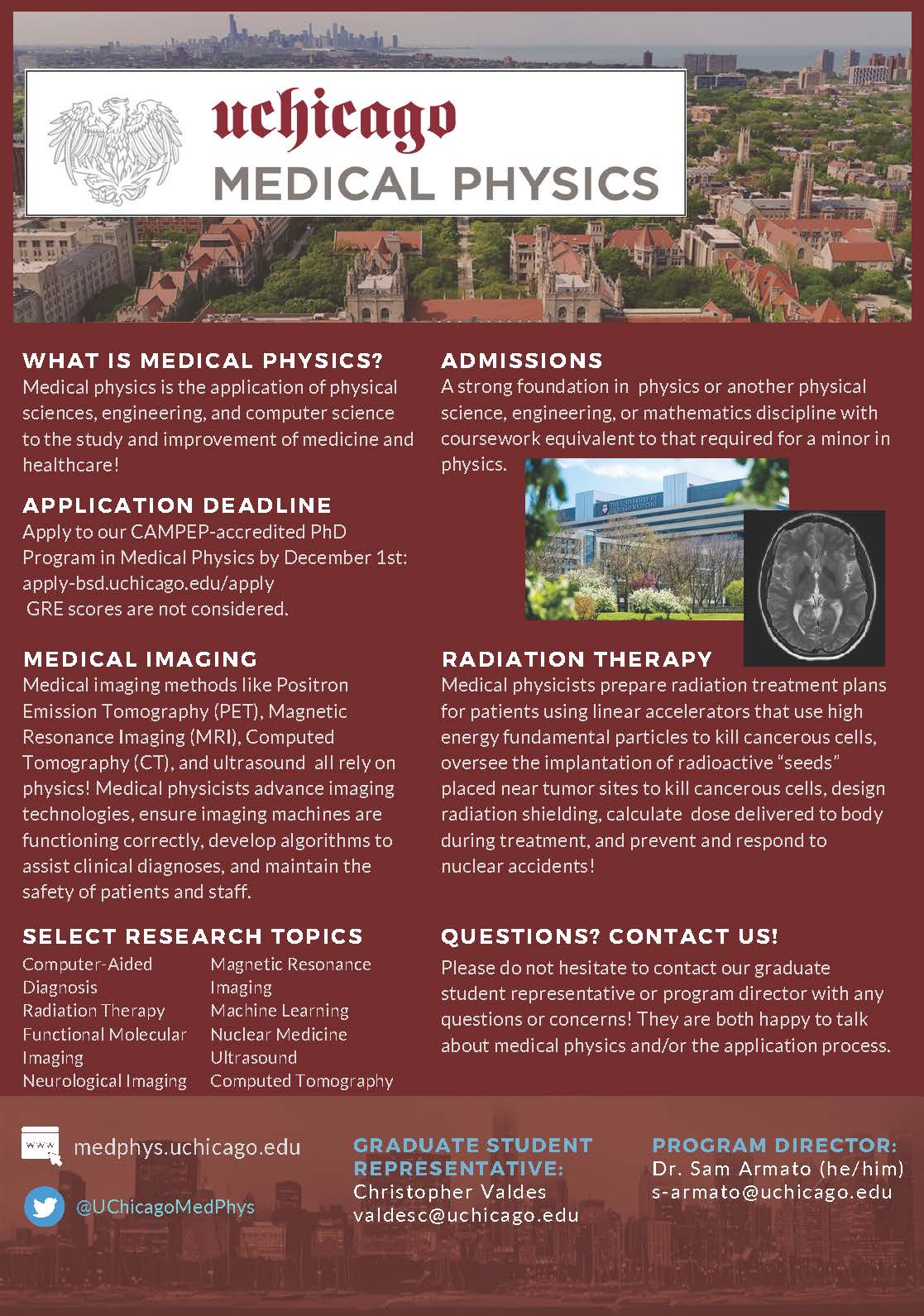
The Post-Doctoral Certificate in Medical Physics provides core medical physics education for those who hold a PhD in a technical field from a non-CAMPEP accredited degree program. The goal of the Certificate Program is to equip the trainee with sufficient theoretical and practical background knowledge in medical physics to enter a medical physics residency program, to be eligible to sit for the American Board of Radiology professional certification exam in radiological physics, and to succeed in a career in medical physics. The certificate program requires 15 credit hours of courses in radiation physics, radiation protection, radiobiology, medical imaging physics, and radiation oncology physics, as well as 3 credit hours of human anatomy. The certificate program can be completed in as few as 8 months.
34 Best Medical schools in Moscow, Russia
Updated: February 29, 2024
- Art & Design
- Computer Science
- Engineering
- Environmental Science
- Liberal Arts & Social Sciences
- Mathematics
Below is a list of best universities in Moscow ranked based on their research performance in Medicine. A graph of 922K citations received by 111K academic papers made by 34 universities in Moscow was used to calculate publications' ratings, which then were adjusted for release dates and added to final scores.
We don't distinguish between undergraduate and graduate programs nor do we adjust for current majors offered. You can find information about granted degrees on a university page but always double-check with the university website.
1. Moscow State University
For Medicine

2. Moscow Medical Academy

3. Russian National Research Medical University

4. RUDN University

5. National Research University Higher School of Economics


6. Moscow Institute of Physics and Technology

7. National Research Nuclear University MEPI

8. Bauman Moscow State Technical University

9. N.R.U. Moscow Power Engineering Institute

10. Russian Presidential Academy of National Economy and Public Administration

11. Moscow State Pedagogical University

12. National University of Science and Technology "MISIS"

13. Mendeleev University of Chemical Technology of Russia

14. Finance Academy under the Government of the Russian Federation

15. Plekhanov Russian University of Economics

16. Moscow Aviation Institute

17. Moscow State Institute of International Relations

18. Russian State Social University

19. Russian State Agricultural University

20. National Research University of Electronic Technology

21. Russian State University of Oil and Gas
22. new economic school.

23. Russian State University for the Humanities

24. Moscow State Technological University "Stankin"

25. State University of Management

26. Moscow State University of Railway Engineering

27. Moscow Polytech

28. Moscow Technical University - MIREA
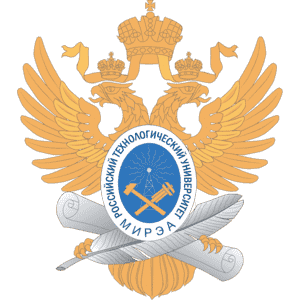
29. Moscow State Linguistic University

30. Moscow State Mining University
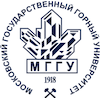
31. Moscow International University

32. Pushkin State Russian Language Institute
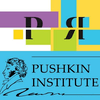
33. Russian State Geological Prospecting University
34. moscow state technical university of civil aviation.
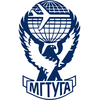
Universities for Medicine near Moscow
Medicine subfields in moscow.
- Find Programs
- Synergy University - Moscow
- National Research University Higher School of Economics (HSE) - Moscow
- National Research University Higher School of Economics (HSE) - Saint Petersburg
- National Research University Higher School of Economics- Nizhny Novgorod
- National Research University Higher School of Economics- Perm
- Saint Petersburg State University
Moscow Institute of Physics and Technology (MIPT)
- First Moscow State Medical University
- Russian Technological University (RTU MIREA)
- TUSUR University
- Novosibirsk State University
- Pyatigorsk State University
- Omsk State Technical University
- Voronezh State University
- RocApply currently will not be Processing Applications to Russian Institutions
- Study in Russia
- COVID 19 Update for studying in Russia
- Visa Requirements
- Application Requirements
- Step-by-step-Admission Process in Russia
- Documents Students should Carry to Russia
- Jobs for Students
- Student Life
- Lifestyle and Culture
- Accommodation
- Student Healthcare and Medical Insurance in Russia
- Scholarships in Russia
- List of High Schools in Russia
- Find Accommodation
- My Applications
Offered Programs
Moscow Institute of Physics and Technology offers extensive courses in preparatory programs, bachelor programs, masters programs, and Ph.D. programs. Although the majority of the programs offer courses in Russian, a large number of programs are primarily taught in English with a large amount to open up as the years' progress.
International students can opt to take lectures in either of the languages or even in both, the tuition fee structure at MIPT is dependent on the language of instruction and are as follows;
RocApply is here to help you with all your application needs, students looking to study in MIPT Russia can use our premium services in the entire process, from start to finish. We assist with student applications, admission facilitation, visa processing, student housing to even airport pickup and student integration in their new locations.
We use our experience to provide our students with an easy study abroad guide and assistance, at the beginning and all through the process. All our services are very straightforward prioritizing our student’s needs every step of the way, our platform is well equipped with all the right information and accessible anywhere in the world. RocApply has extensive experience in all things regarding your studies in Russia, and we are glad to help.
Eligibility Requirements;
After finding what program you can apply for, the next step is to check if you qualify for admission at MIPT, although the application procedure is simplified thanks to RocApply’s easy-to-use application platform, all our applicants must have;
- High school leaving certificate (for bachelor admissions)
- A bachelor’s degree or diploma (for master’s admissions)
- A master’s degree (for Ph.D. admissions)
- Language requirements: applicants applying to Russian-taught programs must take language exams in Russian and English-taught programs require that applicants must show proficiency with results from approved exams like IELTS or TOEFL.
Qualification Requirements
Recently, MIPT demands that some students enrolling in specific programs must take part in certain qualifying events and interviews known as ‘Procturing’. These events are conducted online in collaboration with RocApply, beginning in June towards a September or October resumption date. Subjects written include English, Mathematics or Physics.
For graduate programs, there are also certain qualifying events which are either as an interview or a test depending on the program. Tests or interviews are conducted online via RocApply beginning in June.
Document requirements
Undergraduate
- Online application form via RocApply
- Copy of international passport or identification document
- High school leaving certificate
- Curriculum Vitae (detailing other achievements, qualifications, or awards)
- IELTS/TOEFL results
- Applicants who wish to take their courses in Russian must first enroll in MIPT’s language prep school.
- Copy of bachelor’s degree or diploma
- Copy of masters degree (for Ph.D. programs)
- Personal statement
- 2 recommendation letters from professors or previous employer
- CV or Resume
- *All documents must be notarized and translated.
MIPT provides a tuition fee waiver for applicants who score 85% and above in the qualifying exams, and also scholarships for graduates of the preparatory course, undergraduates and graduate students of MIPT, and transfer students continuing their education at MIPT. Participants of short term internships and summer and winter MIPT schools also receive tuition waivers from the university.
Select your Degree
Application requirements for bachelors:, select your field of study for bachelors, select your bachelor program, application requirements for masters:, select your field of study for masters, select your master program.
Master's in Advanced Combinatorics (MSc)
(2 years) 4 Semesters
3000€ / Semester
Master's in Neural Networks & Neural Computers (MSc)
Master's in Blockchain (MSc)
Master's in Cyber Security (MSc)
Master's in Aerodynamics (MSc)
Master's in Beam-Plasma Systems and Technologies (MSc)
Master's in Industrial Bioinformatics (MSc)
Master's in Digital Transformation (MSc)
Master's in International Business, Entrepreneurship
Moscow Institute of Physics and Technology (MIPT) in Rankings
Ranked 20th in the whole of russia, ranked 400th in the world., tuition and scholarships at moscow institute of physics and technology (mipt).
The university provides funding to international students through several schemes designed to reduce the cost of tuition or to cover the student’s expenses while studying there, funding at the university are both internal and external and happen and all foreign students at the university are eligible to receive some sort of financial assistance during the course of their program at MIPT.
MIPT Scholarship: The university awards a special scholarship to foreign understudies who show dynamic academic qualities, or students who have strong academic backgrounds and can replicate this while studying at MIPT. This scholarship is highly coveted and is awarded competitively.
Russian Government Scholarship: The Russian government reserves special funding for international students studying at MIPT. The funding scheme covers all academic costs for the entire duration of the program in bachelor's, masters, and Ph.D. levels. Interested students must apply as early as possible after being accepted.
MIPT Olympiad: The MIPT Olympiad is a healthy academic competition where excellent students display their knowledge on a variety of subjects akin to their field of study. The top students compete amongst themselves and the winner is awarded a full-ride sponsorship towards their education at MIPT.
MIPT Student Financial Support: Foreign students can apply for financial support from the university towards their living expenses in Moscow. MIPT gives stipends to a large number of its international students every month, and the awardees must continue to excel academically in order to continue receiving this financial aid.
Cost of living at Moscow Institute of Physics and Technology (MIPT)
About moscow institute of physics and technology (mipt).
The Moscow Institute of Physics and Technology is one of the top five universities in Russia and is well known all over the world, since its inception in 1946 as a department of Moscow State University and later as an independent organization in 1951, MIPT is has been highly regarded by scientists, engineers, and students alike.
The MIPT university-industry partnership system was introduced by its first professors, the Nobel Prize winners L.D Landau, P.L Kapitsa, and N.N Semenov. It selects talented students and provides them with a top-class education and an early entry into industrial research.
MIPT scientists perform cutting-edge research in the fields of fundamental science and push the boundaries of human understanding, creating new technologies and contributing to global development.
The university explores neural and aerospace engineering, biophysics and nuclear science, quantum optics and aeromechanics. The university research center devices mathematical models to account for all of the diversity in nature.
MIPT research labs feature international teams driven by professors with global credentials and aspirations. Nobel Laureates Andre Gain and Constantin Navoselov who won a prize in physics in 2010 are MIPT alumni.
The university is tailoring and determining the success of society and humanity through science, and introducing excellent ways to look into the future. To date, MIPT pushes the boundary of human understanding with scientific principles and learning modules that are unrivaled anywhere in the world.
Some of the Moscow Institute of Physics and Technology (MIPT) Achievements.
- MIPT has ranked in the top 100 spots in world university reputation ranking in the last two years by Times Higher Education (THE)
- MIPT ranks in the top 100 world universities for subjects like Physical Science and Computer Science and ranks in the top 300 world universities for Engineering, Technology, and Life Science by Times Higher Education (2020)
- MIPT is among the topmost reputable universities in Russia, presently rated as at the top 3 higher education institutions in the country.
- In Russia, MIPT stands as the most award-winning university, bagging several industries and scientific awards throughout its history. Ten professors from Phystech are Nobel Laureates winning prizes in Physics, Chemistry, Peace, and Astrophysics. Also, many of MIPT’s research specialists and doctors have been awarded Dirac medals, BBVA Foundation awards, and prizes in Fundamental Physics both in Russia and internationally.
Student Life at MIPT
Academics: MIPT is a leading research center with about 79 well-equipped laboratories for experiments and research. The major fields are biomaterials and microelectronics, energetics and specialized machine engineering, universal and specialized quantum computers, quantum cryptography, mechanisms of aging, genomic engineering, optogenetics, biomedical cell products, artificial intelligence, machine learning, robotics, expert systems, cybersecurity, technical vision, space technology.
Phystech Start-Up: MIPT designed a project to support and develop student ideas and projects, students join mentoring educational programs to receive knowledge, advice, and recommendation on the development of projects from successful entrepreneurs, graduates of MIPT, and experts of tech companies.
Internships: In MIPT students have the possibility to secure internships at the best Russian and international companies. The experience gained contributes largely to the success of many of its student's careers after they graduate.
Campus Life at MIPT
MIPT has a very conducive and up-to-date campus that is very comfortable for life and study at the university. Present on campus are more than 15 buildings comprising of administrative buildings, academic buildings, medical centers, dormitories, cafeterias, and the other facilities, the university campus also has 24/hours security and surveillance. Phystech’s campus is located 20 minutes from Moscow, the heart of Russia.
Social Activities at MIPT
There are more than 50 student activities and clubs that cater to several student interests, MIPT students can participate actively in any of these clubs or societies and can even carve out their own in their own area of interest with approval from the university.
Student clubs are a brilliant way to interact, socialize and build social skills that resonate with the outside world. Examples of such clubs at MIPT include;
- History Club
- Intellectual Games Club
- Painting Club
- Literature Club
- Robotics Technology Club
- Artic Projects Club and many more
MIPT has strong partnerships with many leading universities, organizations and industrial companies both locally and internationally. Many global centers of research are also affiliated with the university, with remote research units on MIPT’s campus enabling student exchange and work and study opportunities on a global platform.
Similarly, a long list of industry companies and corporate organizations have ties with Phystech, fostering internship and job opportunities for MIPT students. Some of MIPT’S partner institutions include;
- Berkely University of California
- Carnegie Mellon University
- Ecole Polytechnique
- Massachusetts Institute of Technology
- McGill University
Some of MIPT’S partner research centers and companies include;
- Schlumberger Research & Development
- Hitachi and GE
In MIPT, there is a unique educational ecosystem based on a 70-year history of development. MIPT’s system of instruction called the ‘Phystech System’ was proposed by its founders. The key principles were outlined from the beginning, which entails;
- First students are trained by researchers of leading scientific and technological institutions with modern technical equipment.
- Secondly, students have individual works with the university,
- Thirdly each student begins their research from their second or third year of education and
- Lastly, upon graduation, the students have great knowledge of the modern methods of theoretical and experimental research and necessary engineering knowledge to solve technical problems.
The strong teaching of fundamental knowledge and extensive practical work in partner research institutions allow MIPT graduates to build a career in any field of professional activity.
The link between study and practice means students learn to apply their theoretical knowledge in the real world.
A Forbes 2019 rating on university graduates shows that MIPT is one of the top 3 universities with the most popular graduates, taking into consideration factors like average salary, presence of billionaires, membership in boards of directors of the largest Russian and international companies.
Noteworthy is that ten of Phystech alumni are amongst the top 200 entrepreneurs in Russia, and many of its graduates have gone on to found successful start-ups and tech companies.
Why Study at Moscow Institute of Physics and Technology (MIPT)
Accommodation moscow institute of physics and technology (mipt), on campus accomodation at moscow institute of physics and technology (mipt).
MIPT provides student housing at both its Dolgoprudny and Zhukovsky locations, as of now there are 14 student halls of residence owned and managed by the university and housing the majority of its students.
The dormitories come in different types and different specifications but they are all adequately maintained and equipped with all the necessary facilities.
Some of them are student dormitories with one or two bedrooms, a central kitchen space, and bathroom area, while the others are apartment-style rooms with kitchen and bathroom ensuite.
Every room at every dormitory has 24/hours electricity, heating, and wireless internet, similarly, all dorms are guarded full-time. Amenities refrigerator, washing machine, and microwave are also provided to students in the dormitory.
The type of campus housing that a student will get is contingent on their department and level of study as dormitories are separated int different spectrums to create a more relatable atmosphere for its students.
Accommodation price at MIPT can cost somewhere between 1,000 RUB to 2,000 RUB.

Off Campus Accomodation at Moscow Institute of Physics and Technology (MIPT)
Typically, some students opt to live in separate accommodations outside the university campus where there are many private houses and apartments that cater to various student budgets and need.
There are also several dormitories and private out-of-school lofts and pads that have different costs. The expense of leasing off-campus apartments changes from area to area in proximity to the city square and they have different conditions for rent.
Commonly, the cost of leasing a one-room condo is around 1,500 to 2,000 RUB per month and it depends on how extravagant the building is and the services they offer.
Renting an apartment out of campus usually means that utilities such as electricity, water, heating, cable tv, and internet all come separate from the rent and students would have to shoulder the bills per usage.
Sports at Moscow Institute of Physics and Technology (MIPT)
The sports and recreational facilities at MIPT’s campus help develop the competing spirit of its students and staff. The university has 3 sports centers, a Phystech stadium, and an Olympic standard swimming pool. The most anticipated sporting event at the university is the 24 hours traditional football contest amongst departments of MIPT, fondly dubbed as the ‘Match of the century’.
Phystech students, staff, and alumni actively participate in this 50-year long tradition that is one of the points of pride for the institution. In recent years, the university started the same event for swimming games called ‘Swimming of the century’.
At MIPT there are over 15 sports clubs and athletic activities such as Basketball, Water Polo, Table Tennis, Alpine Skiing, Mountain Climbing, Crossfit, Athletics, Yoga, Lawn Tennis, Fitness Aerobics, Football, Chess, Dancing, and many others. MIPT prioritizes its students' fitness and physical well-being as they contribute to healthy student life.

Food at Moscow Institute of Physics and Technology (MIPT)
Available on campus are several canteens and cafeteria that serve various meals to students and staff at different hours of the day. Students who take up residence in any of MIPT’s dormitories have access to the free canteen and buffet-style service for breakfast, lunch, and dinner.
The university also has a break area where other external restaurant chains have taken up space serving a variety of fast food and continental meals to students. The price of feeding at the university costs about 30 RUB to 50 RUB per person depending on their food choices.
Transportation at Moscow Institute of Physics and Technology (MIPT)
Testimonials, about moscow.
Moscow is the capital and the largest city in Russia with a population of more than 12 million people located in the Moskva River in the west of the country. Moscow for Russians is the center of everything, and everything is centered here where all the headquarters of major Russian cooperations are located.
Moscow contributes the largest to the country’s economy both in industry and influence. Although the weather in Russia is believed to be quite severe, Moscow’s weather is milder than in other parts of the country. Moscow has the best university’s in Russia, one of which is the Moscow institute of physics and technology (MIPT).
Moscow enjoys a much higher standard of living compared to other cities and has one of the highest amounts of billionaires topping cities like London and Paris. Moscow is home to all the federal authorities of the country from federal to state levels and is heralded as a city of status.
Moscow also has the largest amount of English speakers and international residents that any other city in the country, the city is also very green with more green areas than New York or London.
The city center is a serene getaway with one of the largest parks where residents come to relax and unwind at the end of the day. The social life in Moscow is one of the best in the world, with a vast array of bars, pubs, and restaurants that serve all types of cuisine to suit most budgets.
How RocApply Works
Explore programs.
Browse through more than 400 programs offered in Russia and find your best fit here
Find your university
Compare and research about all Russia universities and their special fields here
Apply within RocApply
Apply easy and secure with just one mouseclick to your favourite study program for free here
Track your progress
Track your application process at every time within RocApply on your MyApplications Page
Prepare your journey
RocApply will guide you through the Visa process, finding accomodation and flights.
Get connected
Don't go to Russia alone! Get connected with fellow students from your country and travel together!
Further Info About Russia
Moscow Institute of Physics and Technology (MIPT) on Social Media
Our Instant Messengers
- Make a Gift
- Directories
Search form
You are here.
- Programs & Courses
- B.S. Degree
Undergraduate Research
Engaging in research is the most effective way of learning how real science is performed, and undergraduate research has become an increasingly important component of graduate school applications. Working in a lab is a great way to develop the experience and skills necessary for both graduate school and industry. The UW Physics Department aims to provide research opportunities for all Physics majors regardless of financial need.
University of Washington faculty perform internationally recognized research across a very wide range of areas. From the highest energy particle collisions to single ions for quantum computing, from gravity to dark energy to the universe’s first stars, from quantum materials to batteries for green energy, from the evolution of SARS-Cov-2 and HIV to measuring faint magnetic signals from the brain, from neutron stars to dark matter, from quantum gravity to quantum chaos, there are diverse opportunities for undergraduate students to become involved in ground-breaking research.
Getting involved in research
The first step is to find a faculty research mentor. Our Door Knocker page provides a list of Physics faculty who serve as undergraduate research mentors. Before you approach a faculty member to ask about research opportunities, please read over the Student Research Guide and be prepared with good answers to the questions. (Both pages are available on MyPhys under Student Information.) Because lab openings change and some research requires specific skills, you will likely need to approach a number of faculty to find a research opportunity that matches your interests and current skills. Be patient, open-minded, and persistent. If you would like advice on which research areas and groups might be a good fit, you are encouraged to schedule an office hours visit with the Undergraduate Research Coordinator . Once you have found a research mentor, you will work with them quarter by quarter to agree on how many hours per week you will work, plan your schedule, and discuss whether your effort will earn Phys 499 credit, be performed as a volunteer, or be compensated as part of Work Study or as an hourly employee.
Undergraduate Research Coordinator
The Physics Department Undergraduate Research Coordinator is Prof. Miguel Morales . Feel free to send email to [email protected] or arrange an office hour visit to discuss questions about the department’s undergraduate research programs.
Work Study Program
The Physics Department has allocated significant resources to enable students to use Work Study hours to perform undergraduate research. If you have Work Study as part of your financial aid package, you may arrange to be paid for your research. Once you have found a Physics faculty member to serve as your research mentor, simply go to the physics front office with your Work Study confirmation email and, contingent on available funds, staff will arrange for you to be hired as an undergraduate researcher . As an employee you will submit your hours bi-weekly for approval by your research mentor. The number of hours you work will be agreed upon with your research mentor up to the maximum provided by the Work Study award.
Can I sign up for both research credit (499) and Work Study? No. School and employment are legally separate, so it is not possible to obtain credit for the same hours you are paid.
I would like to be part of this program, but no Work Study hours were included in my financial aid award. Every financial aid award is unique, but in cases when there is a particularly promising opportunity (like research) it is sometimes possible to adjust a financial aid package to include Work Study hours. Please talk with your financial aid counselor to see if Work Study hours can be added to your financial aid package.
Other research access programs
In addition to the Work Study program the physics department has a number of additional programs designed to broaden access to undergraduate research. Please explore the following to see if they are a good match for you.
Louis Stokes Alliance for Minority Participation (LSAMP)
A wide range of internship, mentorship, and leadership programs for under-represented STEM students.
Physics Program for Advanced Training in Hands-on Science (PATHS)
A Community College transfer program using the power of research. Community College students can be paid to start research before they transfer to UW, seeing what real research is like and building strong interpersonal connections at UW.
INT Undergraduate Research Network (INTURN)
Both school year and summer research positions working with members of the University of Washington’s internationally famous Institute for Nuclear Theory.
UW Physics Research Experiences for Undergraduates (REU)
A 10 week summer program of intense research hosted at the University of Washington.
- Events Mailing Lists
- Newsletter
- QUICK LINKS
- How to enroll
- Career services
Comparing the differences between MD vs. PhD vs. professional doctorate
By Michael Feder

This article has been vetted by University of Phoenix's editorial advisory committee. Read more about our editorial process.
Reviewed by Marc Booker, PhD, Vice Provost, Strategy
At a glance
- MD is the abbreviation for Doctor of Medicine and PhD stands for Doctor of Philosophy. These are two types of doctoral degrees in addition to professional doctorates.
- An MD is a doctoral degree for medical professionals, while a PhD is an academic degree focused on original research. Somewhat similar to a PhD are professional doctorates, which focus on applying practical research to problems in workplaces or communities.
- A professional or practice-based doctorate (EdD, DBA, etc.) can be medical, and others are for scholar-practitioners in disciplines like education, business or psychology.
- University of Phoenix does not offer MD or PhD programs, but students can earn a doctorate in business, nursing, education or healthcare that allows them to build upon their industry expertise. Learn more about the differences between these degree programs and if one of the five doctoral programs at University of Phoenix is right for you !
What is a doctorate? Breaking down the three types
Some people might confuse an MD (Doctor of Medicine) with a PhD (Doctor of Philosophy) , and vice versa. While both an MD and a PhD are prestigious degrees near the top of the academic ladder , they each have a different meaning and come with very different requirements .
Different still from both of those degrees are professional doctorates, which allow industry professionals to translate their education and experience into credibility and leadership through research. Professional doctorates have similar requirements to PhDs, such as a dissertation and residency, but focus on the application of research and professional growth over original research.
Upon graduation, those who have earned any of these three degrees can call themselves a “doctor,” but the path to a degree, the purpose behind it and its applications vary based on the choice. MD graduates want to work in medicine and healthcare. PhDs want to bring new knowledge and research to the world. A practice-based doctoral graduate wants to grow in their professional expertise. (If the last one sounds like you, University of Phoenix can help!)
Keep reading to learn more about these doctoral programs and which is right for you.
What does MD stand for?
MD is an abbreviation for Doctor of Medicine and identifies a medical practitioner who has completed undergraduate studies and four years of medical school. An MD program teaches medical students about the human body and diseases through a combination of classroom instruction and hands-on clinical labs.
Several types of physicians might have this degree, depending on their area of study. For example, medical practitioners with an MD degree might become a medical doctor and potentially specialize in dermatology, cardiovascular disease, family medicine, oncology, pediatrics, neurology or preventive medicine. As you can see, this degree can lead to a variety of career paths , depending on which specialty interests you and what your medical education is.
Learn more about online doctoral degrees at University of Phoenix.
How to earn an MD
Becoming a Doctor of Medicine requires a significant investment of time and money, but the reward can be well worth it. Before medical school, you’ll need to take the Medical College Admission Test (MCAT ® ) and earn a passing score. You’ll also need to build a portfolio of coursework and experience to help you gain admittance to medical school.
Medical school typically takes students four years to complete. You’ll learn the latest techniques and approaches for patient assessment, diagnosis and treatment. Medical schools commonly provide a combination of classroom, research and clinical experience . You’ll work alongside peers and healthcare professionals as you develop skills in general medicine.
You’ll choose a field to specialize in during your final year of medical school. Students have more than 120 options to choose from when specializing, including primary care, pediatrics, geriatrics, emergency medicine and family medicine .
After graduating, you’ll complete residency training to further develop skills in your specialty. Residency typically lasts three to seven years, depending on the field you’ve selected. During the residency portion of your education, you’ll treat patients under the supervision of more experienced physicians.
Even after you begin to practice as an MD, the educational portion of your career never stops . As practices change, patient needs evolve and research continues, MDs benefit from ongoing education to stay current.
What does PhD stand for?
A PhD, or Doctor of Philosophy , is a doctoral degree that recognizes graduates who have completed a full postsecondary program. Students can earn a PhD in more fields than philosophy. After completing the necessary coursework, original research and hands-on experience, you can earn a PhD in fields like science, the humanities and engineering.
Earning a PhD can help unlock a wide range of potential career opportunities. Computer engineers, research scientists, statisticians, healthcare administrators, professors, chemists and other careers commonly require a PhD degree, in addition to appropriate undergraduate study.
How to earn a PhD
Becoming a PhD is also a serious commitment that requires an investment of time, money and energy .
Here is what’s typically required to become a PhD:
- Complete a bachelor’s degree in your field
- Complete a master’s degree in an appropriate field
- Pass any program entrance exams
- Fulfill coursework, research and hands-on lab requirements in your program
- Finalize and defend your dissertation as a doctoral candidate (unless your program specifies otherwise)
It’s important to note that many PhD programs have different requirements , prerequisites and parameters for students. Check with your preferred institution for a more detailed explanation of these requirements.
What is a professional doctorate?
While some professional or practice-based doctorate programs are medical, others are designed for professionals in other fields . These programs are meant for scholar-practitioners in disciplines like education, business or psychology. One of the key differences between this degree and a PhD is the focus on applying research to a professional setting rather than conducting theoretical and research-focused studies. Often, programs are differentiated as academic versus professional.
Examples of doctoral degrees are Doctor of Education, Doctor of Nursing Practice and Doctor of Business Administration. Each of these programs focuses on a specific discipline and applying research in those areas to a professional setting.
How to earn a doctorate
While practitioner doctoral programs teach different skills, they all share common requirements. You’ll need to complete a bachelor’s degree in your field and sometimes a master’s degree, depending on program requirements.
After completing the necessary coursework and research, students also typically need to finish a supervised thesis and defend their dissertation or capstone project-specific coursework, research and hands-on labs alongside other students in the same field. However, this will depend on the specific program and its requirements.
What does the title “Dr.” really mean?
The term “doctor” or “Dr.” is commonly used today to describe a wide variety of occupations. Students who complete a doctoral degree can earn the title of “Dr.” even though they earned their credentials in a non-medical field like education or business management.
While a variety of professionals can earn a doctorate, the term is often still reserved for medical practitioners . In conventional use, doctors typically refer to medical physicians . However, it is appropriate to use “Dr.” if you graduated from any of the three programs discussed above.
read similar articles

What is doctoral candidacy?
Practitioner doctoral degree programs at university of phoenix.
While University of Phoenix (UOPX) does not have MD or PhD programs, it does offer several professional doctoral degrees that can be earned completely online. Students might choose the UOPX programs because classes are flexible and offered online, and because of the University’s unique “ Scholar-Practitioner-Leader model .”
If you are curious about a doctoral degree, the following programs are available at UOPX:
- Doctor of Business Administration — This doctorate can help you gain strategic vision and skills to position yourself as a business leader. It explores how to solve organizational problems, how to design and conduct research studies, how to introduce innovative business ideas to the industry and more.
- Doctor of Management — This doctorate equips you with critical thinking skills to find creative solutions to complex problems.
- Doctor of Education — This doctoral program prepares you to use analytical, critical and innovative thinking to improve performance and solve complex problems in education.
- Doctor of Health Administration — If you’re a health professional who is seeking greater responsibility in shaping the future of the health sector, this doctorate can help you meet the challenges inherent to today’s healthcare landscape, including economic fluctuations, burgeoning patient needs and industry-changing legislation.
- Doctor of Nursing Practice — This doctorate is designed for working nurses who require a doctorate for advanced practice or nurses who desire their terminal degree. It does not prepare students for professional certification or state licensure as a nurse or as an advanced practice nurse.
These doctoral studies are only some of the many options for professionals who want to gain the highest academic credentials in their fields. Doctoral programs offer significant benefits to program graduates, including newly developed skills , insight into field trends, hands-on research opportunities and leadership capabilities .
Completing a doctoral program is also a strong indication to employers that you’re serious about your career and your field. With so many options for advanced study, these programs are available for most major fields. Even if you have already completed a bachelor’s or master’s degree in your discipline, a doctorate lends further credibility to your reputation and can help prepare you for a leadership position .

ABOUT THE AUTHOR
Michael Feder is a content marketing specialist at University of Phoenix, where he researches and writes on a variety of topics, ranging from healthcare to IT. He is a graduate of the Johns Hopkins University Writing Seminars program and a New Jersey native!

want to read more like this?

Can I Go to a University Without Taking the SAT or ACT?
Online degrees.
July 21, 2023 • 7 minutes
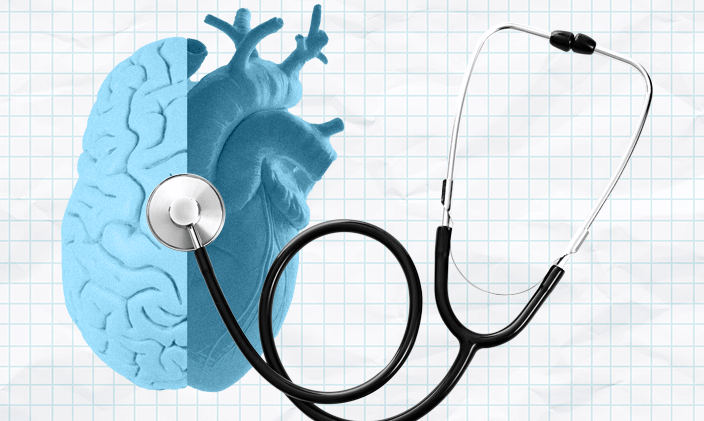
List of Skills Needed for Nursing
August 14, 2023 • 9 minutes

3 Reasons You Should Get a Graduate Degree
September 15, 2021 • 7 minute read

IMAGES
VIDEO
COMMENTS
The Medical Physics Graduate Program is an interdisciplinary program sponsored by five departments: radiology, radiation oncology, physics, biomedical engineering, and occupational and environmental safety (health physics). Four academic tracks are offered: diagnostic imaging physics, radiation oncology physics, nuclear medicine physics, and ...
Accredited degrees: M.S., Medical Physics Program Director:Christopher Kleefeld, Ph.D. 353 (0) 91-495383 / Fax: 353 (0) 91-494584 [email protected]. Oregon Health and Science University Medical Physics Graduate Program 2730 SW Moody Avenue Portland, OR 97201 Program Director: Thomas Griglock, Ph.D. [email protected]
Medical physics is an applied branch of physics that applies physical energy to the diagnosis and treatment of disease. Professional medical physicists are involved in clinical service, consultation, research and teaching. At Purdue, the medical physics graduate program provides a strong foundation in radiological and applied physics training ...
The Medical Physics Graduate Programs are strong proponents of diversity, equity, and inclusion. We support students from diverse backgrounds because we believe that fostering an inclusive, multicultural environment benefits our students, our programs, and the field of medical physics at large.
Candidates who are simultaneously applying for graduate study with one of our partner units at Harvard - the Harvard Biophysics Graduate Program or the Harvard School of Engineering and Applied Sciences (SEAS) - may optionally follow these instructions to apply to participate in the MEMP curriculum in conjunction with their PhD at Harvard ...
HST's MEMP PhD Program Is this program a good fit for me? HST's Medical Engineering and Medical Physics (MEMP) PhD program offers a unique curriculum for engineers and scientists who want to impact patient care by developing innovations to prevent, diagnose, and treat disease. We're committed to welcoming applicants from a wide range of communities, backgrounds, and experiences.
The Biomedical Physics (BMP) Graduate Program is a PhD training program hosted by the Departments of Radiology and Radiation Oncology within the Stanford University School of Medicine. The objective of the PhD in BMP is to train students in research focused on technology translatable to clinical medicine, including radiation therapy, image ...
PhD Program in Medical Physics The Committee on Medical Physics offers a program to provide aspiring medical physicists with the knowledge they will need in their future professions. Our program leads to the Doctor of Philosophy degree with an emphasis on research that provides preparation for careers in academia, industry, and/or clinical ...
Master of Science (ScM) in Medical Physics. Brown's Graduate Program in Medical Physics combines a rigorous curriculum, superb clinical settings and a unique focus on research training to prepare students for professional success. Faculty and staff are engaged and motivated to equip students with the knowledge and professional competencies ...
A doctoral minor or Graduate/Professional certificate is not required for students in the Medical Physics Graduate Program as graduate students enroll in sufficient breadth courses required for completing the "CAMPEP Track" in our graduate program (>98% of students). However, a student can complete a minor or certificate offered by another ...
About. The Medical Physics Education Program is available to enrolled Dartmouth PhD students in engineering and the physical sciences who have an undergraduate preparation in physics (of at least four courses beyond introductory college physics). This program was accredited in 2016 by the Commission on Accreditation of Medical Physics Education ...
A professional doctorate program, typically leading to a degree of Doctor of Medical Physics (DMP) consists of at least two years of didactic education followed by at least two years of clinical education. **Granted administrative extension of accreditation while under review for reaccreditation.
The Medical Physics Team provides clinical physics and dosimetry services at the Moffitt Cancer Center clinics. It currently consists of 19 physicists (nine faculty), 18 dosimetrists, and two medical physics residents. Program faculty from MCC also includes non-physicists from various clinical and research departments.
The Medical Physics Graduate Programs reserves the right to request an English proficiency test or interview from any applicant, may make enrollment in English language courses a condition for admission, and/or may subsequently require that an admitted student enroll in English language courses based on an assessment of the student's English ...
The Medical Physics Graduate Program offers MS degrees (with either a Thesis or Non-Thesis option) and PhD degrees in Medical Sciences with a concentration in Medical Physics. Candidates for all graduate degrees must be in good standing with the graduate school, having a GPA of 3.0/4.0 or greater, and have no "Incomplete" grades on their…
The medical physics graduate program leads to an MS and/or PhD degree, through the Jacobs School of Medicine and Biomedical Sciences, in association with the Department of Radiology. The program's goal is to provide a sound academic foundation and practical experience for those planning to pursue a career in research, teaching or clinical ...
The Medical Physics track is accredited by the Commission on Accreditation of Medical Physics Education Programs (CAMPEP), which recognizes that our training has met CAMPEP requirements. ... These faculty members do not accept graduate students. They participate in teaching, co-mentoring, exam and dissertation committees, and all other program ...
Graduate Programs › Medical Physics, MS; Overview; Admission; Requirements; The program is designed for full-time students who wish to pursue a career as a medical physicist either as a researcher, as a certified clinical profession, or in industry. The program will require successful completion of a minimum of 38 credits for Master's ...
Graduate Program in Medical Physics Brown University Box G-K4 Providence, RI 02912 Email [email protected] Brown University. Giving to Brown. Providence, Rhode Island 02912, USA; 401-863-1000; Contact Us; Maps; Directions; Career Opportunities; Campus Safety; Accessibility; All Social Media
The Committee on Medical Physics offers a program to provide aspiring medical physicists with the knowledge that they will need in their future profession. Our program leads to the Doctor of Philosophy degree with emphasis on research that provides preparation for careers in academia, industry, and/or clinical support roles. The medical physics ...
As part of our continued growth and expansion, the University of Florida's Medical Physics Graduate Program (a concentration under Medical Sciences in the College of Medicine) is currently recruiting MS and PhD students for Fall 2024 admission. Five incoming students will be funded as graduate assistants - three in Diagnostic Medical Physics by the Department…
The Post-Doctoral Certificate in Medical Physics provides core medical physics education for those who hold a PhD in a technical field from a non-CAMPEP accredited degree program. ... and to succeed in a career in medical physics. The certificate program requires 15 credit hours of courses in radiation physics, radiation protection ...
Moscow 34. Saint Petersburg 17. Omsk 6. Tomsk 6. Ranking methodology. Below is the list of 34 best universities for Medicine in Moscow, Russia ranked based on their research performance: a graph of 922K citations received by 111K academic papers made by these universities was used to calculate ratings and create the top.
Offered Programs . Moscow Institute of Physics and Technology offers extensive courses in preparatory programs, bachelor programs, masters programs, and Ph.D. programs. Although the majority of the programs offer courses in Russian, a large number of programs are primarily taught in English with a large amount to open up as the years' progress.
Engaging in research is the most effective way of learning how real science is performed, and undergraduate research has become an increasingly important component of graduate school applications. Working in a lab is a great way to develop the experience and skills necessary for both graduate school and industry. The UW Physics Department aims to provide research opportunities for all Physics ...
Medical Specialist's degree is designed to get a fundamental scientific education. General Medicine is one of the basic programmes of the medical Specialist's degree. The education takes 6 years, and then the graduate becomes a qualified General Physician.
How to earn an MD. Becoming a Doctor of Medicine requires a significant investment of time and money, but the reward can be well worth it.Before medical school, you'll need to take the Medical College Admission Test (MCAT ®) and earn a passing score.You'll also need to build a portfolio of coursework and experience to help you gain admittance to medical school.
The specialist's degree programme in General Medicine (hereinafter "the Programme") is designed to prepare a qualified physician, M.D. possessing a system of universal professional competencies, capable and ready for independent occupational practice. An objective and qualification tasks of the Programme are based on the Federal State ...
Retirement program. Upon hire you have the option to contribute to the 401(k) plan offered by Northwell Health. Employer contribution is offered at 100% match up to 3% of salary, 2-year vesting. ... All time away from formal graduate medical education, other than allotted PTO, may lead to a shortfall in the time needed to complete the ...
Cryogenics Facility Manager. The Department of Physics and Astronomy, with Shared Research Support Services, Dietrich School of Arts and Sciences, and the Western Pennsylvania Quantum Infrastructure Core, invites applications from individuals with a PhD or equivalent in Engineering or Physics or a closely related discipline for the Cryogenics Facility Manger position at a rank of research ...